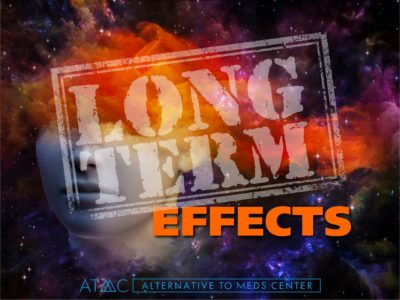Does Taking Wellbutrin Long-term Change the Brain?
We could find no published long-term or extensive studies on the effects of Wellbutrin on the human brain. A case report of one female given bupropion for 6 weeks showed an increased volume of grey matter, white matter, and overall brain volume compared to pre-treatment. In a study published in the German Journal of Psychopharmacology, monkeys were given amphetamines over a period of time, and then their brains were scanned. Their brain images showed similar increases in grey matter volume in one specified area of the brain. Other studies on humans who were recovering from dopaminergic drug use showed that brain volume is altered both during drug use and after a period of abstinence. Dopaminergic drugs such as heroin and amphetamines, but not Wellbutrin, were studied. The results were inconclusive beyond demonstrating that drug use was associated with increased volume in some areas of the brain, and decreased volume in other areas of brain tissue, and that drug abstinence was also associated with similar alterations of brain volume. As Wellbutrin is also a dopaminergic drug, these results are of some interest here, but researchers will have to test further to determine any information that would be helpful to drug regulators, prescribers, and consumers.7-9
Does Wellbutrin Taken Long-term Become Habit-forming?
In drug terminology, habit-forming means having addictive characteristics. Stimulants, including coffee, all have a tendency to become habit-forming. Drug tolerance is a factor in the architecture of addiction. Drug tolerance means reduced or diminished effect, therefore as a result of prolonged exposure, one is led to take a higher dose to get similar effects, and to avoid discontinuation syndrome. At the cellular and biological level, a complex set of changes occurs, referred to as plasticity, that results from the chronic effects of daily ingestion of the substance on the internal organs and tissues, including the brain. Over time, these changes become chronic, and addiction or dependence develops.15
Studies have reported on crushing and snorting bupropion, and intravenous use for recreational users as a substitute drug for cocaine or crack. Wellbutrin has been nicknamed “poor man’s cocaine” in news stories, and its addictive potential has been reported in research published in the Journal of Addictions Nursing and the Journal of Addictive Medicine.10,11 Bupropion has become extensively used in the prison population as it is legal and easy to procure. Users who inject are particularly vulnerable to abscesses that form at the injection site due to the caustic nature of the drug which can cause deep tissue injuries that extend right down to the bone and also can cause spinal injury. Users who snort the crushed powder have been shown particularly vulnerable to seizures, due to the high doses that are involved. Bupropion has seen a significant rise in the number of people between the ages of 13 and 29 who abuse the drug and may end up at the emergency department suffering from seizures, hallucinations, tremors, tachycardia, agitation, and many other unmanageable reactions, including death. It is worth noting that the length or chronicity or method of use did not significantly determine the frequency of patients presenting with seizures. 12,13,16
However, most users of Wellbutrin are not recreational users but are taking it as prescribed. Nonetheless, any dopaminergic or stimulant drug can become habit-forming, especially after it has been used for a long time and tolerance or dependence has developed. Never abruptly stop taking Wellbutrin, but seek medical assistance for a well-supervised, gradual reduction to avoid severe discontinuation symptoms.1
Are There Drug-free Options to Avoid Long-term effects of Wellbutrin?
In the best of all worlds, holistic remedies for depression would be considered first-line treatments. But we live in an imperfect world, and many become tangled up in prescription drug treatments that have the potential to worsen rather than improve conditions.
In contrast, nutrition is a highly effective, though largely overlooked, therapy for preventing and reversing mental health sub-optimum conditions. Nutritional neuroscience has demonstrated how factors such as emotions, behavior, and cognition are reliant on nutrition.23
Whether one has not yet begun drug treatment or is in a recovery phase that likely includes cessation, holistic therapies exist that can help eliminate the original symptoms that led to a prescribed drug regimen.
Alternative to Meds Center uses an extensive palette of drug-free treatments for recovery after Wellbutrin or other drugs failed to achieve the desired results. You can view these in great detail on our services overview pages.
Because of complications that can arise from abrupt dopaminergic drug cessation, medical oversight and a gradual discontinuation approach are strongly advised.
Is Wellbutrin Safe for Pregnancy?
Safety studies have shown that bupropion is excreted into breast milk. Wellbutrin is classed as a C drug for pregnancy, which indicates the drug should be avoided unless there is strong medical justification to take the drug. 2
A long-term study conducted on 136 pregnant women discovered that there were significantly more spontaneous abortions (miscarriages) in the women who were taking bupropion in the first trimester — 20 in total, from a group of 136 women.17
These are safety concerns that should be discussed with caregivers so that healthy decisions can be made well before any negative consequences may arise for the mother or child.
Recovery from Long-term Effects of Wellbutrin at Alternative to Meds Center
Orthomolecular medicine provides a foundation for a successful transition to becoming drug-free and achieving improvements in mental well-being. There are many aspects to recovery that include testing for nutritional deficiencies, neurotoxin removal, correction of diet, as well as an enormous number of therapies that can bring about positive changes that can be sustained for the rest of one’s life without relying on prescription drugs for relief.
Please contact us for more information on our holistic, medically supervised recovery programs and any other information that may be useful such as insurance coverage, length of programs, and other questions you may have. Alternative to Meds Center has been focused for nearly 2 decades on helping people recover from diverse conditions including successful recovery from the long-term effects of Wellbutrin and other mental health concerns.

 The antidepressant Wellbutrin (first approved in 1986) is classed as an NDRI. NDRI is is an acronym for the 2 main neurochemicals that it targets, and the reuptake-inhibiting mechanism that the drug imposes on the transmission of these natural chemicals throughout the nervous system.1,4
The antidepressant Wellbutrin (first approved in 1986) is classed as an NDRI. NDRI is is an acronym for the 2 main neurochemicals that it targets, and the reuptake-inhibiting mechanism that the drug imposes on the transmission of these natural chemicals throughout the nervous system.1,4 Suicidality
Suicidality







